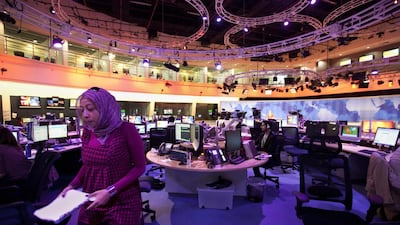ABU DHABI // Qatar is launching a new television station as a political counterweight to Al Jazeera amid concern the network has become too supportive of the Muslim Brotherhood.
The new station is to be an Arabic-language news channel based in London and broadcasting across the Arab world. It is one of several new media ventures launched under the Emir of Qatar, Sheikh Tamim bin Hamad Al Thani, who succeeded his father in June and is seeking to put his own stamp on the country's vast soft power machine.
The driving force behind the new station is Azmi Bishara, the Palestinian director of the Doha-based Arab Centre for Research and Policy Studies, and a close confidant of the emir.
Mr Bishara is known to be “fairly anti-Brotherhood” and willing to criticise the group publicly, said Michael Stephens, deputy director of the Royal United Services Institute for Defence and Security Studies Qatar.
“Bishara recommended that it be started. His own beliefs are that Qatar has been too close to the Ikhwan for too long.”
Mr Stephens said the channel, named AlAraby Television Network, was supposed to launch in January but kept getting pushed back.
It is currently recruiting staff, placing job adverts for a satellite coordinator and a planning producer and headhunting from existing Arabic news stations such as BBC Arabic.
Media outlets serve as Qatar’s main soft power tool on the international stage, especially the Doha-based television network Al Jazeera.
Since its launch in 1996 Al Jazeera has grown exponentially but its criticism of other Arabian Gulf countries and willingness to give voice to members of the Muslim Brotherhood, in line with Doha’s support for Islamists after the Arab Spring uprisings, has angered Qatar’s neighbours.
In one of the worst diplomatic spats in the GCC's history, the UAE, Saudi Arabia and Bahrain withdrew their ambassadors from Qatar in March. The protest came after Youssef Al Qaradawi, a spiritual guide of the Muslim Brotherhood, who has a show on Al Jazeera, continued their policies.
Saudi Arabia considers the Muslim Brotherhood to be a terrorist organisation, a position backed by the UAE.
The new station will serve as a way for Qatar to not only boost its already sizeable media industry, but also allow Sheikh Tamim to step out of the shadow of his father, Sheikh Hamad bin Khalifa Al Thani, and rebalance the country’s policies after drawing the ire of its neighbours.
“My view is that it’s the emir trying to be his own man,” said Andrew Hammond, a Middle East analyst at the European Council on Foreign Relations. “He hasn’t really emerged from the shadow of his father.”
While Qatar would risk losing face and regional influence by closing Al Jazeera, the establishment of the new outlets appears part of a strategy to gain a new audience.
Instead of competing directly with Al Jazeera, the new station would be more likely to compete for viewers with Saudi Arabia’s Al Arabiya television.
Yet with so many Arabic-language news outlets in existence, Qatar’s new ventures are unlikely to offer Sheikh Tamim the same kind of power that Al Jazeera offered his father Sheikh Hamad.
“This channel is designed to correct the image of Qatar, not to assert its interests,” said Mr Stephens.
The television station was registered in the UK in September 2013, according to business records.
Public documents describe the company’s objectives as: “To set up and operate television and broadcsting [sic] stations and services, publishing and printing newspapers and magazines.”
Sabah Al Mukhtar, the London-based lawyer who registered the company, described Al Jazeera as the landmark station, but said it was “less impartial than it was before”.
“Without Al Jazeera you would not have AlAraby, you would not have the other stations that are flourishing all over the place,” Mr Al Mukhtar said.
Qatar has also launched a news website based in London and with an office in Beirut. Named Al Araby Al Jadeed, the website is owned by Fadaat Media Limited, which registered in the UK in May 2013, shortly before Sheikh Tamim took over from his father.
Sultan Ghanim Al Kuwari, a businessman from a prominent Qatari family, is listed on the documents as director.
An employee of Fadaat Media, who refused to give his name, described Al Araby Al Jadeed as intended to offer unbiased political news focused on “liberal freedoms” and the “ideals of the Arab Spring”.
The website will be only in Arabic for now and aims to eventually publish a print edition, he said.
The move to establish new media outlets is likely connected to a wider Qatari strategy that sees Al Jazeera rebranding itself by renaming its sports division beIN and its children’s channel JeemTV.
“I think they are splitting up the brand,” said Mr Stephens.
While Al Jazeera is openly funded by the Qatari-government, its involvement in Fadaat Media and Al Araby Television Network is not clear.
The representative from Fadaat Media denied any connection to a government, saying that the company was invested in by private businessmen.
“It’s not that they need a written signed approval from the emir, but of course they would want his tactic support,” Mr Stephens said of the new outlets.
When Emir Tamim came to power in June 2013, there was an expectation he would change Qatar’s policies.
Yet, there were few immediate signs of change. Though he had abdicated, Sheikh Hamad was still believed to wield considerable power behind the scenes and Tamim did not alter his father’s policies.
Florence Gaub, a senior analyst at the EU Institute for Security Studies, said the location and even the name of the new television suggested Sheikh Tamim had big ambitions for it.
“It shows the ambition to create something new and maybe even shows the ambition to create something bigger than Al Jazeera.”
jvela@thenational.ae

